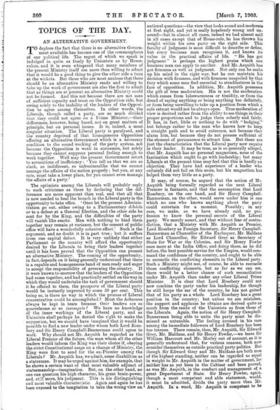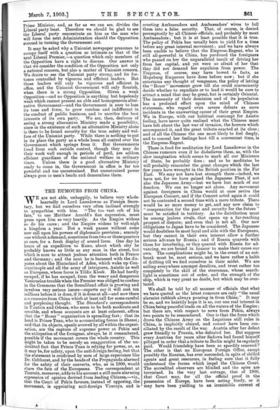TOPICS OF THE DAY.
AN ALTERNATIVE GOVERNMENT.
TO deplore the fact that there is no alternative Govern- ment available has become one of the commonplaces of our political life. The regret of which we speak is indulged in quite as freely by Unionists as by Home- rulers, and it is even whispered that many members of the present Ministry itself are more than willing to admit that it would be a good thing to give the other side a turn at the wickets. But those who are most anxious that there should be an alternative Ministry ready and willing to take up the work of government are also the first to admit that as things are at present an alternative Ministry could not be formed. And this not because there are not men of sufficient capacity and trust on the Opposition side, but owing solely to the inability of the leaders of the Opposi- tion to agree among themselves. In other words, the Liberals, though called a party, are so much divided that they could not agree on a Prime Minister,—their differences, however, being based, not on great matters of principle, but on personal issues. It is, indeed, a most singular situation. The Liberal party is paralysed, and the country deprived of that homogeneous Opposition offering an alternative Government which is a necessary condition to the sound working of the party system, not because the Opposition is weak in statesmen, but solely because they cannot suppress personal feeling enough to work together. Well may the present Government retort to accusations of inefficiency : You tell us that we are so slack, so indifferent, so unbusinesslike that we cannot manage the affairs of the nation properly ; but you, at any rate, must take a lower place, for you cannot even manage the affairs of a party.'
The optimists among the Liberals will probably reply to such criticisms as these by declaring that the dif- ferences are more apparent than real, and that all that is now needed to heal the breach in the Liberal party is the opportunity to take office. Once let the present Adminis- tration go out, either owing to a Parliamentary de'bcicle or to a defeat at a General Election, and the other side be sent for by the King, and the difficulties of the party will vanish like smoke. Men with nothing to bind them together may remain at variance, but the cement of public office will have a wonderfully cohesive effect.' Such is the argument, and no doubt it is in part true ; but it suffers from one capital defect. It is very unlikely that either Parliament or the country will afford the opportunity desired by the Liberals to bring their leaders together until it has been proved that the Opposition can present an alternative Ministry. The coming of the opportunity, in fact, depends on it being generally understood that there is a capable and homogeneous band of men ready and eager to accept the responsibility of governing the country. If it were known to-morrow that the leaders of the Opposition had come together, and had practically settled on the way in which they would undertake the task of government should it be offered to them, the prospects of the Liberal party would be instantly improved by some 50 per cent. This being so, is there no way in which the process of Liberal concentration could be accomplished ? Must the Achaeans always be kept in tears because their leaders are so quarrelsome or so incompris ? We have no knowledge of the inner workings of the Liberal party, and as Unionists shall perhaps be denied the right to make the suggestion, but we should have imagined that it would be possible to find a new leader under whom both Lord Rose- bery and Sir Henry Campbell-Bannerman could agree to work. Why should not Mr. Asquith be regarded as the Liberal Premier of the future, the man whom all the other leaders would. inform the King was their choice if, obeying the strict Constitutional usage on a change of Ministry, the King were first to send for the ex-Premier among the Liberals? Mr. Asquith has, we admit, some disabilities as a statesman. It may be urged against him, for example, that he shows a certain want of that most valuable adjunct of statesmanship—imagination. But, on the other hand, no one can question his high character, his great brain-power, and, still more, his judgment. This is his distinguishing and most valuable characteristic. Again and again he has been exposed to the temptation to take the wrong view on national questions—the view that looks sound and moderate at first sight, and yet is really hopelessly wrong and un- sound—but in almost all cases, indeed we had almost said in all cases except that of Home-rule, he has thrown his weight within his own party on the right side. This faculty of judgment is most difficult to describe or define, but every business man recognises it, and knows its value in the practical affairs of life. "He has got judgment" is perhaps the highest praise which one business man can apply to another. And Mr. Asquith has got firmness as well as judgment. Not only can he make up his mind in the right way, but he can maintain his decision with firmness, and with firmness unspoiled by that fury which some men find essential to steadfastness in the face of opposition. In addition, Mr. Asquith possesses the gift of true moderation. His is not the moderation which comes from lukewarmness or timidity, or from the dread of saying anything or being anything too definitely, or from being unwilling to take up a position from which a safe retreat would not be always open. True moderation of view is derived rather from the ability to see things in their proper proportions and to judge them soberly and fairly. It has, in fact, little or nothing to do with "hedging," but belongs rather to the man who knows how to keep a straight path and to avoid extremes, not because they alarm him, but because they do not possess sufficient of the element of permanence to attract him. But these are just the characteristics that the Liberal party now require in their leader. It may be true, as is so generally alleged, that Mr. Asquith has no personal magnetism, none of the fascination which ought to go with leadership ; but many Liberals at the present time may feel that this is hardly an objection. They have had experience of a leader who certainly did not fail on this score, but his magnetism has helped them very little as a party.
It may, of course, be argued that the notion of Mr. Asquith being formally regarded as the next Liberal Premier is fantastic, and. that the assumption that Lord Rosebery, on the one band, and Sir Henry Campbell- Bannerman, on the other, would serve under him is one which no one who knows anything about the party could entertain for a moment. Possibly; in any case, we make, as we have already said, no pro- fession to know the personal secrets of the Liberal party. We merely assert, and that without fear of contra- diction, that a Ministry with Mr. Asquith as Premier, Lord Rosebery as Foreign Secretary, Sir Henry Campbell- Bannerman as Chancellor of the Exchequer, Mr. Haldane as Lord Chancellor, Sir Edward Grey as Secretary of State for War or the Colonies, and Sir Henry Fowler once more at the India Office, and doing there, as he did before, the best possible service for the Empire, would com- mand the confidence of the country, and ought to be able to reconcile the conflicting elements in the Liberal party. Such a Ministry might not, of course, be able to reconcile those conflicting elements, but as far as we can see, there would be a better chance of such reconciliation under Mr. Asquith than under, any other Liberal Prime Minister. It is clear that Lord Rosebery could not now combine the party under his leadership, for though he still keeps the ear of the country, he has not gained that of his party as a whole. Lord Rosebery has a great position in the country; but unless we are mistaken, the support and applause he obtains are derived quite as much from the ranks of the Unionists as from those of the Liberals. Again, the notion of Sir Henry Campbell- Bannerman being able to unite the party must be dis- missed as untenable. The feeling aroused in his case among the immediate followers of Lord Rosebery has been too intense. There remain, then, Mr. Asquith, Sir Edward Grey, Mr. Haldane, and Sir Henry Fowler,—we leave. Sir William Harcourt and Mr. Morley out of account, as it is generally understood that, for various reasons, both now consider themselves as outside practical party politics. But though Sir Edward Grey and Mr. Haldane are both men of the highest standing, neither can be regarded as equal in weight to Mr. Asquith in the matter of government, for neither has as yet been in the Cabinet and been proved, as was Mr. Asquith, in the conduct and management of a great Department of State. Sir Henry Fowler, again, though a most competent and able statesman, would, it must be admitted, divide the party more than Mr. Asquith. In a word, Mr. Asquith is competent to be Prime Minister, and, as far as we can see, divides the Liberal party least. Therefore we should be glad to see the Liberal party concentrate on him as the man who will form the next Administration should the Opposition succeed in turning the Government out.
It may be asked why a Unionist newspaper presumes to occupy itself with a question so intimate as that of the next Liberal Premier,—a question which only members of the Opposition have a right to discuss. Our answer is that we consider the condition of the Opposition not only a national concern, but also a matter of Unionist concern. We desire to see the Unionist party strong, and its for- tunes controlled by vigorous and efficient leaders. But those leaders will only be vigorous and. efficient in office, and the Unionist Government will only flourish, when there is a strong Opposition. Given a weak Opposition—and no Opposition is anything but hopelessly weak which cannot present an able and homogeneous alter- native Government—and the Government is sure to lose its tone and force, to grow careless and indifferent in the conduct of public business, and to sacrifice the best interests of its own party. We are, then, desirous of seeing a strong alternative Ministry made a possibility, since in the existence of such an alternative Ministry alone is there to be found security for the true safety and wel- fare of the Unionist party. While there is nothing to put in its place the party as a whole loses all control over the Government which springs from it. But Governments freed from such outside control, though they may do their work well enough in periods of peril, are seldom efficient guardians of the national welfare in ordinary times. Unless there is a good alternative Ministry ready to come in, the Government in office is far too powerful and too unrestrained. But unrestrained power always goes to men's heads and demoralises them.











































 Previous page
Previous page